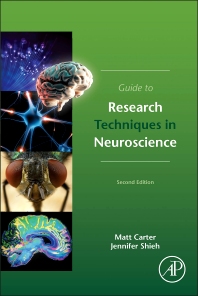
Psychology 323
Introduction to Experimental Neuroscience Methods
Fall 2017

Required Texts: Guide to Research Techniques in Neuroscience. 2nd Edition. Matt Carter & Jennifer Shieh
This text is in the library and can be either signed out or can be downloaded online for free!
This is an advanced undergraduate course in neuroscience methods. At the end of this course you should be familiar with many of the modern neuroscience techniques & paradigms used, their limitations, optimal applications and how they work at t rudimentary level. It cannot be emphasized enough that it is critical to read textbook chapters before relevant material is presented in class. It has been my experience that when students miss lectures, they also do poorly on exams. All of my exam questions are derived from the lecture materials and text.
Tentative Course Outline
|
Week 1 |
Outline, Requirements, Study Skills, Library Research |
|
Week 2 |
Chapter 1 – Whole Brain Imaging |
|
Week 3 |
Chapter 2. Animal Behavior |
|
Week 4 |
Chapter 3. Stereotaxic Surgeries and In Vivo Techniques |
|
Week 5 |
Chapter 4. Electrophysiology |
|
Week 6 |
Chapter 6 – Visualizing the Nervous System Structure |
|
Week 7 |
Chapter 7 - Visualizing the Nervous System Function |
|
Week 8 |
Chapter 8 - Identifying Genes and Proteins of Interest |
|
Week 9 |
Chapter 9 – Molecular Cloning and Recombinant DNA Technology |
|
Week 10 |
Chapter 10 -Gene Delivery Strategies |
|
Week 11 |
Chapter 11 - Behavioral Genetics |
|
Week 12 |
Chapter 12 & 14 - Manipulating Endogenous Genes / Biochemical Assays |
|
Week 13 |
Exam |
Office Hours: I have dedicated office hours posted on my door plus I have a open door policy. This mean that if my door is open, I have office hours so...come in and ask questions. You can also make an appointment to see me if you like. I consider office hours to be an integral part of teaching this course and invite you to do the same.
Grading: There will be a research proposal (33%), two exams (33% each) a participation/experiment execution/presentations mark (33%). The proposal is much like a Psychology 204 proposal but you do not have to carry out the experiment. The proposal includes an Introduction (justifying the reasons for doing the experiment based on literature) as well as the detailed methods and references section (instructions for manuscript preparation can be found under the instructions to the author in the Journal of Neuroscience). One exam will be held in late November and the second during the exam period (I will only count one exam towards your final grade). Exams will consist of short answers only and will be taken from the class and the text. You do not have to write the second exam if you are happy with your marks on the first. If you write two, I will take the best exam mark if you write both exams. Your participation mark will come from doing a class presentations and presenting a research papers on a weekly basis. Finally, I grade on a curve...just thought you should know.
Presentation #1 - Pick one of the areas of neuroscience fields listed below and research it's history....including, determining the fathers of the field, seminal papers, subject matter, conferences, textbooks, and maybe what hot in the field today. The presentation will be restricted to 5 minutes max...(you will be cut off if you go over time) and should be exciting. The presentation can be done from your seat (standing)! This can be done individually or in a group (up to 4). One powerpoint slide is required ...to sent to me in advance. Due date....next class.
Presentation #2 - This presentation will involved presenting (in detail) a presentation on one of the following neuroscience techniques. The presentation will be 30 minutes max and can be done in group up to 4.
- genomics/microarrays
-proteomics
-knockout/knockins
-patch-clamp/intracellular/extracellular recording
-optgenetics
-gene delivery stratergies
-microdialysis
-learning/conditioning
- gene delivery techniques
-MEG/EEG
-fMRI
-Diffusion tensor Imaging
-Transcranial Magnet Stimulation
-Hacking your brain
-Cryoelectron microscopy
-Computational Neuroscience
The following branches of neuroscience can be broadly categorized in the following disciplines (neuroscientists usually cover several branches at the same time):
Don't have an area to research? Pick one of the following schools and investigate the neuroscience program...what good about the program, how to get in, highlight a few researchers etc. You can also tackle the question at the bottom.
UBC
UVic
SFU
U of Toronto
McGill University
McMasters University
Dalhousie University
Memorial University
What do neuroscientist do other than work as a professors?